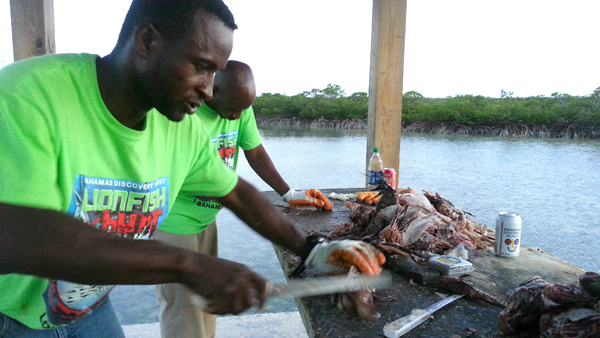Dis some crap in the Bahamas eh?

SEYMOUR’S, Long Island – The Ministry of Tourism and its partners have come together to further heighten the awareness of the invasive venomous Lionfish in Bahamian waters and steps to eliminate its impact on local species.
One such avenue is the Lionfish Hunt II, a competition and cook-off between local fishermen and chefs, held May 17 to 18, 2013 at Seymour’s Dock.
A predominately fishing economy, the island, which is 90 miles long and four miles wide, is split by the Tropic of Cancer. It is noted for the famous Dean’s Blue Hole and steep rocky headlands. A concerted effort has been launched to heightened the presence of the Lionfish which has been sighted following the passage of the devastating Hurricane Andrew in 1992.
The Department of Marine Resources has classified the Lionfish as an invasive alien species outcompeting and preying on commercially and ecologically important marine species. And, the best way to manage the species is to eat it.
Hence the two-day hunt and cook-off explored the hunting, handling, cleaning and eating of the Lionfish, which is proving to be quite the delicacy.
Approximately 270 fishes were caught, the largest up to 16 inches in size. Organiser and fisherman Charles Knowles and Frederick Arnett, Assistant Fisheries Officer at the Department of Marine Resources donned impenetrable gloves and spearheaded the handling and cleaning of the catch which was fillet and shared amongst the restaurants involved in the cook-off.
Chefs from Cape Santa Maria and Stella Maris Resort prepared the fish in a variety of dishes such as fish cakes garnished with locally gown pineapples, and stir-fried Lionfish in a tropical Thai curry sauce also with freshly grown pineapples.
Samantha Fox of the Ministry of Tourism office on the island underscored the importance of educating residents and tourists about the Lionfish.
“The Ministry of Tourism has partnered with individuals in the community in their efforts to bring further awareness about the species,” she said.
“It (hunting) has also become a tourist attraction, when visitors come into Long Island, divers take them out snorkelling and educate them about the species.”
She said because of the abundance of the species, restaurant owners are being encouraged to add it to their menus. And, entrepreneurs to use parts of the fish for jewellery and other craft items once the venom is cured through cooking.
Another organiser of the Lionfish hunt Theresa Knowles of Bahamas Discovery Quest said based on snorkelling expeditions, there was a noticeable growth in the numbers of the Lionfish. They became so prevalent so they started studying them.
“It was shocking because Long Island is a fisherman’s island and without fish available, the economy would really go down fast.
“So, we decided to put together a Lionfish hunt and at least be able to clean the shoals, the shores and coral reefs right along the edges of Long Island and begin to educate individuals about what could be done,” she said.
For the first Lionfish hunt, she said the committee worked very hard for three months and was quite shocked at the response that people felt the Lionfish meat was great to eat.
Subsequently, individuals were approached and handed information about the Lionfish and what it could do to the local marine resources.
The ultimate goal is to work with The Bahamas Marine Exporters Association in putting the Lionfish on the market, she said.
“The Lionfish hunts are great but it is a temporary measure. But the long-term goal is to be that any fisherman can sell Lionfish meat on the market.”
Frederick Arnett, Assistant Fisheries Officer at the Department of Marine Resources said the department has been playing a significant role in the awareness and education of the Lionfish since 2009, when it developed the National Lionfish Response Plan with the College of The Bahamas.
Since then, the department has actually signed on to a regional project called Mitigating the Threats of Invasive Alien Species in the Insular Caribbean (MTIASIC).
The Department of Marine Resources is the national executing agency for that project, a four-year programme aimed at addressing the invasive species issue, generally within the region.
There is nothing unique about the prevalence of the Lionfish in the waters surround Long Island, as opposed to other islands in The Bahamas, Mr. Arnett said.
“This information sharing, knowledge awareness and the whole community gathering should happen in each of our major islands,” he said.







